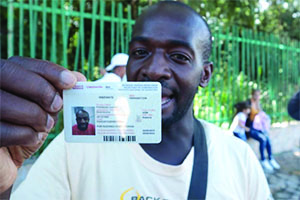by the El Reportero‘s wire services
Amazon, Chedraui, Bimbo and Walmart are among 50 companies that have joined a coalition of major businesses committed to hiring refugees and migrants “at scale” in Mexico.
The coalition is an initiative of the Tent Partnership for Refugees, a network of large companies committed to hiring and training people who have been displaced from their countries of origin.
Tent México, which was officially launched on Wednesday, is the network’s “first national coalition to launch in Latin America, adding to existing coalitions in Canada, France, Spain and the United States,” Tent said in a statement.
Among the other companies that have signed on to the project in Mexico are:
- Hotel chains Accor, Hyatt, Hilton and Marriott.
- Food and beverage companies Chobani, Kellanova, Pepsi and Femsa.
- Retailers H & M and Coppel.
- Paint manufacturer Comex.
- Telecommunications company AT & T.
- The bank HSBC.
- The recruitment companies Randstad and Manpower.
- The tech firms PayPal and Microsoft.
Tent, founded by Turkish billionaire and Chobani CEO Hamdi Ulukaya, said that the 50 companies are “committed to hiring refugees and migrants at scale, as well as providing them with job preparation support, in Mexico.”
“… In recent years, Mexico has welcomed more than 600,000 displaced people from countries such as Venezuela, Haiti, and Cuba — yet many have been unable to find formal employment,” the organization said.
“At the same time, 75 percent of employers in Mexico say they struggle to find workers and Coparmex, the Mexican Employers Association, reports between 1.2 and 1.6 million vacancies in Mexico’s labor market,” it said.
“Today, Tent is launching a first-of-its-kind coalition of Mexico’s largest employers to bridge this gap — helping Mexican businesses fill acute labor shortages by harnessing the talent of refugees and migrants who are eager to build new lives in Mexico.”
While most migrants who come to Mexico hope to enter the United States, a growing number are choosing to stay here, at least temporarily. Applications for asylum in Mexico reached a record high last year.
Gideon Maltz, CEO of Tent, said that companies in Mexico “have an incredible opportunity to meet their labor needs by hiring refugees and migrants.”
“By doing so, companies will see incredible dividends, they will gain loyal and dedicated workers, all while helping refugees and migrants become self-sufficient and contribute to their new community,” he said.
Just under three-quarters of respondents to a Tent-commissioned survey of more than 800 adults in Mexico — 74 percent — said they are more likely to buy from a company that hires refugees.
“Notably, this percentage is higher than any of the other eight markets where Tent has conducted similar research, including the United States, Spain, and Germany, underscoring Mexican consumers’ strong support for companies helping refugees,” Tent said.
José Antonio Fernández, chairman of Coca-Cola bottler and OXXO owner Femsa, said that Femsa has “hired thousands of refugees and migrants over the years, and … seen firsthand the tremendous impact they have made on our company, our employees, and our community.”
“We look forward to building upon this success and deepening our work with Tent to welcome even more refugees and migrants into the Femsa workforce,” he said.
It remains to be seen whether more migrants will choose to remain in Mexico as a result of the launch of the Tent project, which will be supported by the International Organization for Migration.
Undocumented migration to the United States reached record levels last year, prompting the U.S. government to ask Mexico to do more to stop the flow of migrants to its northern border.
The U.S. Department of Homeland Security last month attributed a decrease in migrant encounters all along the 3,145-kilometer-long border with Mexico to enhanced enforcement actions by Mexico; Mexico moving migrants along the country’s northern border to the southern border; and Mexico reinstating deportations of Venezuelans.
President López Obrador, who has offered Central America migrants work on government infrastructure projects, believes that the key to reducing migration to the United States is to invest in development and employment projects in the main source countries, such as Guatemala and Honduras in Central America and Haiti in the Caribbean.



